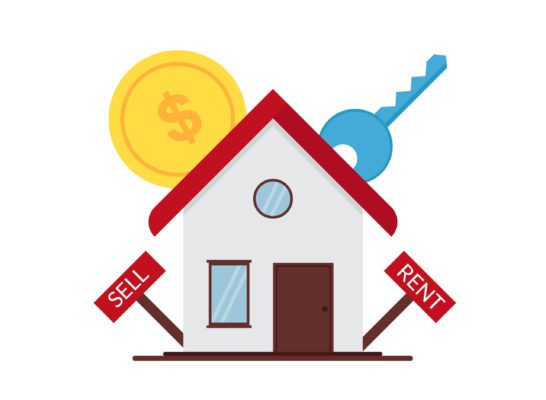
A booming sellers’ market combined with an uncertain future for the rental industry has many owners questioning if now is the time to sell. Smaller landlords have been hit hard by the financial impact of the COVID-19 pandemic and subsequent eviction bans. As that ban now stretches to the end of June (maybe further), what is a landlord to do? If your tenants are thousands behind on rent, selling may look like an attractive way out. Especially since in many areas across the country, inventory is low, and demand is very high. This means homes have the potential to sell quickly and with multiple offers. However, with a tenant in place, the process gets a bit more complicated. Join us below as we discuss the process for selling a rental during COVID and whether it is the best choice for you.
Can a Landlord Sell a Rental During COVID?
The short answer is yes; a landlord can choose to sell the home at any time and for various reasons. If the property is vacant or the tenant has given notice and intends to vacate soon, selling is a straightforward process. That said, if the property is occupied, selling does not dissolve the existing lease agreement. The terms of the initial agreement bind the landlord and anyone who buys the rental property.
 Is Now the Time to Sell?
Is Now the Time to Sell?
Choosing to sell an investment property, especially as the pandemic still affects many areas, is a big decision. Whether you have grown tired of the stress of being a landlord or your property is not producing the income you need, selling may be a good option.
Currently, much of the nation is experiencing a seller’s market. This means demand is high thanks to buyers taking advantage of record-low rates, and the supply of homes is too low to meet the demand. For sellers, this is good news because a great property could sell fast and for more than it otherwise would. So, is now the time to sell? Let’s review some of the common reasons owners may consider getting out while they can below –
- The Property has Increased in Value
- Local Demand is High
- Positive Cash Flow is Declining
The Property has Increased in Value
Ideally, a rental property will appreciate over time. For example, many investors choose to purchase in up-and-coming neighborhoods to get the best deal initially. So, depending on how long you have had the property and how the neighborhood has improved, selling may be more profitable than continuing to rent. Therefore, research the local market and see what similar units are on the market and what has recently sold. If you stand to make a significant profit, it might be time to sell!
Local Demand is High
It goes without saying that the real estate market depends on strong buyer demand. That said, some areas draw more potential buyers than others. Often, these same areas are popular with renters due to work opportunities, amenities, or quality of life. Especially when selling a rental property during COVID, owners must gauge the health of the area around them to determine if it can draw top dollar.
Positive Cash Flow is Declining
One of the best reasons for considering selling a rental property during COVID is a lack of rental cash flow. Keep in mind; this dwindling profit margin could result from several factors that do not include monthly rent collection. Unexpected maintenance costs, rising taxes, or added competition in the rental market all affect an owner’s bottom line. After all, rental properties are a numbers game, and if more is going out than coming in, it may be time to sell. One of the biggest mistakes investors make is hanging onto a failing investment too long.

Before making any final decisions, investment properties always come down to the numbers. Ask yourself, what will be the best decision in the long run? While owning rental property could generate a source of passive income, many owners have been hit with costs and lost rents over the pandemic that outweigh the benefit of holding on. In that case, a sellers’ market is welcome news.
Selling a Rental During COVID With Tenants in Place
Selling your rental with a tenant in place can become complicated. Therefore, it is essential to understand the rights of both parties and any applicable laws. Let’s review some of these considerations below –
Vacant or Occupied? – Review the Rental Agreement
The rental agreement offers the first indication of the next steps for selling your rental property. Some leases stipulate the tenant gets the first right of refusal. Thus, meaning they can have the first chance to purchase the property if they wish. Additionally, every lease should contain an early termination clause. This is the best-case scenario if selling a rental property and is your most profitable option. Therefore, owners have the ability to terminate the lease under certain conditions, one of which is to sell. Beyond that, the type of lease affects the landlord’s ability to give notice if they intend to sell a property vacant. Let’s review a few scenarios below –
- Month-to-Month Leases – On a month-to-month lease, the landlord can give notice to the tenant of their intent to non-renew the lease so they may sell the property. That said, check the terms of the lease and local laws to ensure you adhere to notice requirements. Typically, the landlord must provide 30 to 60 days’ written notice.
- Long-term Leases Ending Soon – Generally, a rental lease will be between 12 and 18 months. So, if the lease is ending soon, owners have the option to non-renew the tenant and sell the home. That said, the owner must provide adequate written notice per the lease and any applicable local laws.
- Long-term Leases Not Ending Soon – When you want to sell, but the tenant is in the middle or beginning of a lease, it is important to remember that the lease terms must be upheld. Therefore, a landlord cannot force a tenant to vacate even if they intend to sell. This means you can offer to let the tenant out of their lease or sell the property with the tenant in place.
Other Options to Remove a Tenant and Sell
- Cash for Keys Incentive – The idea of incentivizing a tenant to leave may not sit well with every landlord. Especially since the pandemic has left many landlords holding the bag for unpaid rent and fees. However, evaluate the pros and cons of your situation – would paying out now help avoid a costly eviction process later? If so, it is worth at least considering. Essentially, cash for keys is an owner-provided incentive or offer of payment to vacate. The benefit is that the offer may encourage a tenant to vacate faster. Therefore, allowing you to market and sell your property sooner.
- Wait for the Lease to Expire – Sometimes, waiting for the lease to naturally expire is your best option. If the tenant is unwilling to vacate on their own, trying to show the house and market with them in it could be detrimental. Just be sure to send a non-renewal notice in the proper timeframe to avoid any disputes. Typically, 60 to 90 days is sufficient, but check the terms of your lease. The advantage here is that you fulfill your obligation as a landlord and make a clean break.
 Hit the Market! – Selling with Tenants in Place
Hit the Market! – Selling with Tenants in Place
When a signed lease is in place, the tenant has legal rights to reside in the unit. That said, owners do not have the right to drop in or show the unit whenever they want without proper notice. While most jurisdictions recognize 24 hours as enough, be sure to check your lease and local jurisdiction to ensure you comply. Especially in times of an ongoing health crisis, everyone’s safety must be at the forefront. Check out these few tips below that can make marketing a home with tenants in place a smoother process –
Tips for Safely Selling a Rental Property During COVID
- Utilize Technology – Many realtors embrace virtual tours as a way to reach more browsing clients. Selling a rental property during COVID-19 means, this convenient technology can allow buyers to view the home without disturbing existing tenants. That way, only serious prospects schedule an in-person tour.
- Limit Contact – Even before COVID, tenants would not have wanted endless buyers traipsing through their homes. Now more than ever, selling a rental property during COVID requires planning and coordination with your tenants. Ideally, set up a schedule of available times to show the property that both you and the tenant agree to. Furthermore, limiting buyer and tenant contact is best for a few reasons. If possible, schedule times where the tenants can temporarily leave the premises. Not only does this help eliminate person-to-person contact, but it also allows buyers to explore the space freely.
- Cleanliness is Key – The idea of cleanliness addresses two major points. One is the state of the home and the tenant’s personal belongings. Request that the tenant cleans up if necessary and offer a professional cleaning service when the home is particularly messy. After all, no buyer wants to walk into a cluttered or dirty home. The other issue is cleanliness and safety during the pandemic. So, when selling a rental property during COVID, reassure your tenant of the safety precautions you or your realtor have in place, such as – required masks, use of hand sanitizer, and wiping down touched surfaces, or minimal contact with doorknobs and light switches.
The Best Alternative to Selling When Landlords Have Had Enough
Most anyone would agree this has not been an easy year for rental property owners. As large corporations battle it out in court looking for eviction loopholes, private landlords are left sifting through the rapidly evolving eviction ban and regulations. If selling a rental property during COVID is not the right fit for you, having qualified professionals on your side is the next best thing.
Bay Property Management Group knows the uphill battle many private landlords face navigating the effects of the COVID pandemic across the industry. For top-notch customer service and experienced property managers in Manassas and throughout Northern Virginia, give us a call today. Our helpful team will walk you through the benefits of full-service rental management, and we offer a free, no-obligation rental home analysis!

 Is Now the Time to Sell?
Is Now the Time to Sell? Hit the Market! – Selling with Tenants in Place
Hit the Market! – Selling with Tenants in Place